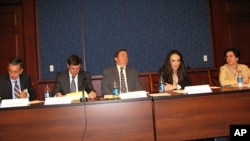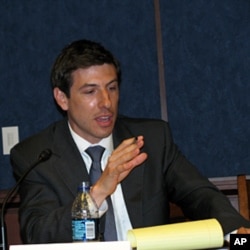When he addressed the Muslim and Arab worlds from Cairo one year ago, President Obama signaled his intention to promote democracy in the region. He pledged U.S. support for governments that protect their citizens' right to speak their minds and have a say in how they are governed, and that respect the rule of law and the equal administration of justice.
There has been widespread public agreement in the Middle East that President Obama said many of the right things in his Cairo address. Experts in Washington agree that he said them in the right place, because it is Egypt that will be the real test of Obama's commitment to democracy.
Quiet diplomacy
Andrew Albertson, executive director of the independent Washington-based Project on Middle East Democracy, says people across the region are still looking for signs of tangible U.S. support for political reform. He says the administration's efforts to use quiet, private, closed-door diplomacy sends the wrong message to people.
"I think that telegraphs to people that they don't think it is important to speak openly to them, to communicate. They think it is not important to engage them and involve them in the process of change, and that is a problem." He adds that it sends the wrong signal to governments, as well.
Albertson notes that the U.S. has urged Egyptian President Hosni Mubarak to suspend the 28-year-old emergency laws that have curbed the nation's political life. Mubarak has refused and the Middle East analyst says people are asking what Washington is going to do about it.
He recommends that the Obama administration engage with civil society in Egypt and signal its support for their efforts to promote political reform and respect for human rights.
Time for a policy review?
The Obama Administration says it is engaging with Egyptian civil socity. But Dina Guirguis, a research fellow at the Washington Institute for Near East Policy, says that approach has not yielded hoped-for results. "Things in Egypt on the ground have been deteriorating, manifested in the renewal of the emergency law. Clearly the U.S. administration is not making the progress that I think it hoped it would make through quiet diplomacy," she concludes, recommending that the Obama administration review its policy one year after Cairo to decide what has worked and what hasn't, and look at other options.
Among these other policy options, she says, is using U.S. aid or free trade agreements as pressuring tools, and showing a stronger official response to violations of human rights or lack of progress in political reform.
Egyptian activist Saad Eldin Ibrahim agrees that the Obama administration has not used available leverage to influence political reform in his country. Now living in exile in the United States, the sociology professor at the American University in Cairo was imprisoned by the Mubarak regime for advocating free elections and political reform.
"These dictators will never respond until they are pressured," Ibrahim insists, "and if they take pressure off the table, then the dictators will have a free pass and they will continue to rule despotically, as they have for the last thirty years. So I hope they will do something because we have two years that will shape not only the future of Egypt, but also the future of the Middle East, because wherever Egypt goes, so does the Middle East."
Upcoming elections
Stephen Grand is Director of the Brookings Institute Project on U.S. Relations with the Islamic World. He argues that an early test of Obama's commitment to democracy will be this year's parliamentary elections in Egypt and next year's presidential vote:
"Hopefully it will try to insure that there is a leveled playing field and that the elections are free, fair and the voices of ordinary Egyptians are heard," he says, adding, "I think it would be a mistake for the U.S. to run away from this challenge and sort of allow the existing regime to designate its own successor."
Public opinion surveys in the Middle East reflect a perception that while President Obama promised to help people have a say in how they are governed, the U.S., if faced with a choice, would rather see stability with undemocratic leaders than an unstable democracy. But Tamara Wittes, Deputy Assistant Secretary of State for Near East affairs, says there is no contradiction between U.S. support for democracy and its national interests in the Middle East:
"Our security interests are helped by the advancement of democracy and human rights and I think that is true for the countries of the region as well. I think that the region as a whole will be more stable, more successful and more secure if it is more democratic, and that is the premise from which we work."
A work in progress
After meeting with Egyptian President Hosni Mubarak in Sharm el-Sheikh in June, Vice President Joe Biden issued a statement that included a call for Egypt to continue working for a vibrant civil society and more open political competition. Those are vital goals, he said, if Egypt is to remain strong and serve as a model for the region.
Other experts acknowledge that U.S. support for political reform across the Middle East is a long-term objective, whose success cannot be gauged only one year after the President's address in Cairo. They agree that his Administration's efforts to foster democracy in the region are still a work in progress.











